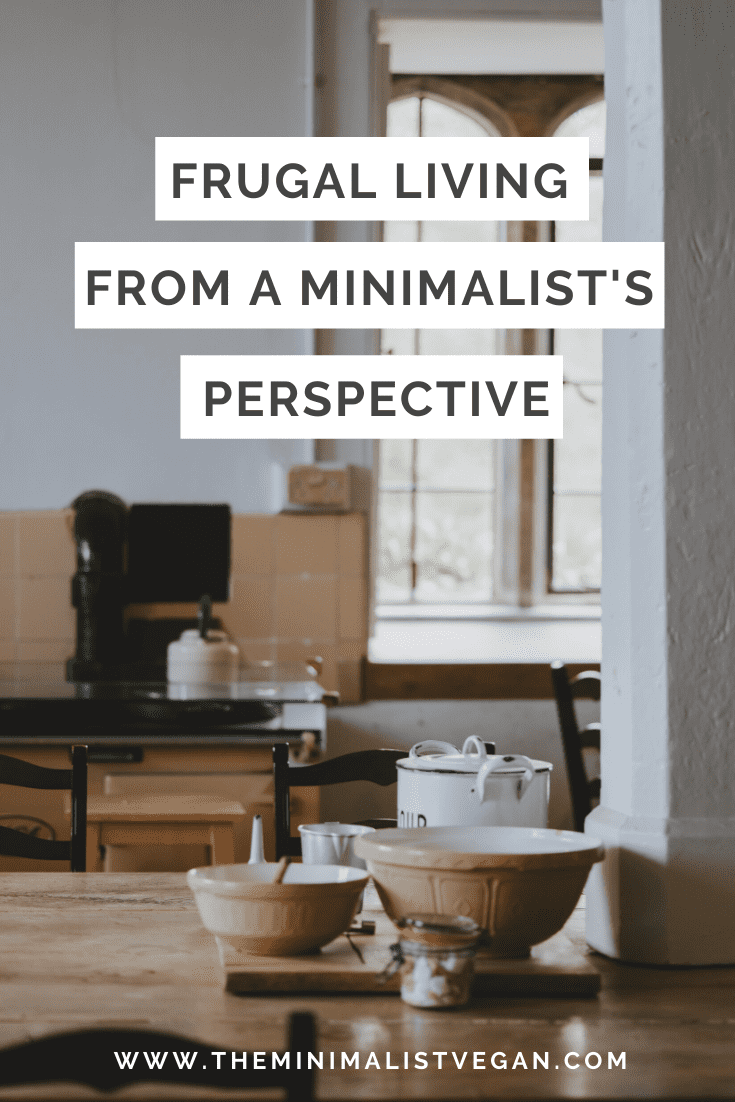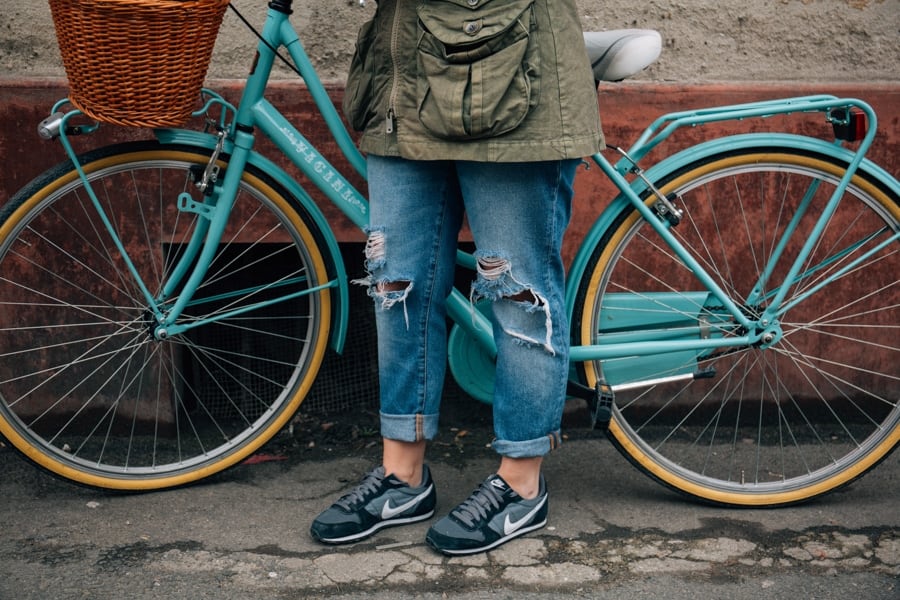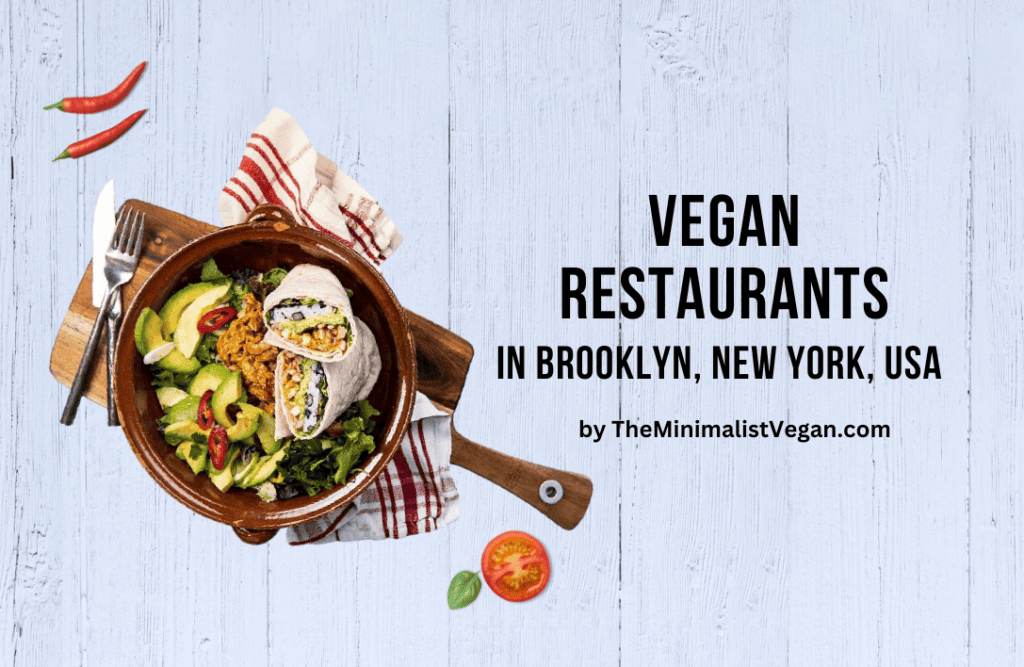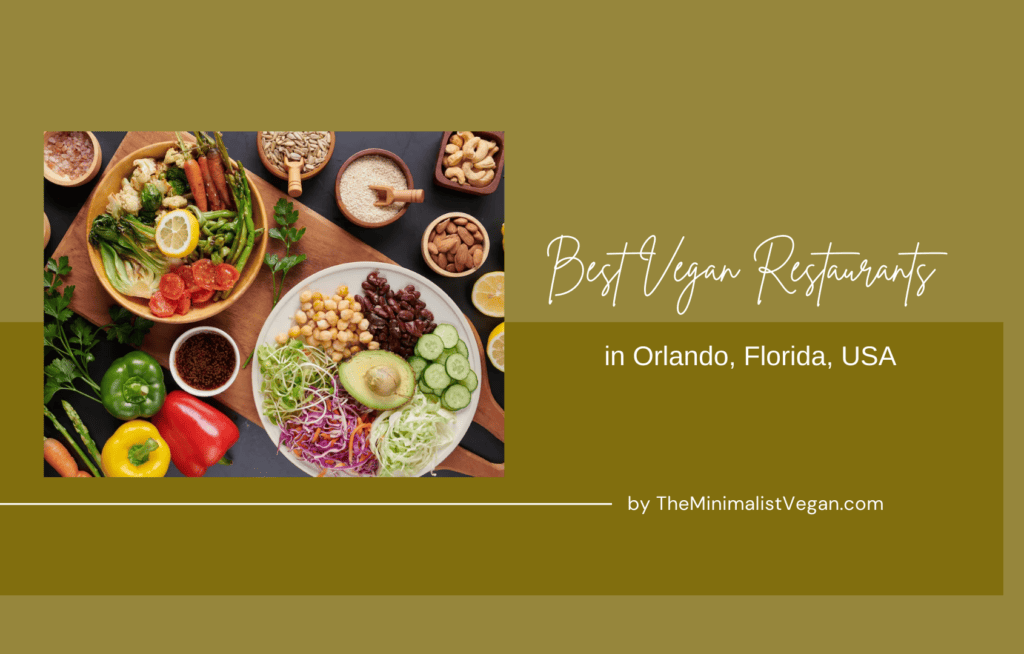On the surface, frugality and minimalism appear to be close relatives. Spending less and buying less go hand in hand. At least so I thought.
It wasn’t until I started researching frugal living that I realised that these two ideas could be at odds.
In this post, I will share why frugal living poses problems for those looking to live with less. At the same time, there are some areas where frugal living amplifies minimalism.
Before we look at the challenges and benefits, defining the frugal mindset and the minimalist mindset is important.
What does frugal living mean?
Frugality is the process of being sparing, thrifty, prudent or economical in the consumption of consumable resources such as food, time or money, and avoiding waste, lavishness or extravagance.
What does minimalism mean?
Minimalism is the process of eliminating the non-essentials in your life, so you can focus on the things that add value.
A minimalist is not necessarily concerned about the cost of something, as long as it adds value. Simultaneously, frugality is more concerned about reducing and avoiding costs to focus on the long-term.
Read more: What is a Minimalist Lifestyle? (And What it’s Not)
Let’s have a closer look at the challenges of being a frugal minimalist.
Holding onto things that no longer add value
Someone frugal is motivated to retain the things they currently own instead of buying new things. This is an excellent mindset to have, especially when it comes to reducing waste.
However, retention of things risks promoting clutter, which is a minimalist nightmare.
There are two thoughts here. And trust me, this is something my wife Maša and I discuss all the time.
One thought is a frugal person will merely hang onto everything they have, even if certain items add no short-term value.
For example, you might hang on to a tool you haven’t used for five years to avoid rebuying the same thing in the future, just in case you need it. Conversely, a minimalist would likely get rid of that tool and not look back.
Another thought I like about frugal living is the motivation to repair things you own instead of buying new ones. For example, repairing your shoes instead of buying a new pair, thus creating less waste and resources. A minimalist may discard the worn shoes and invest in a new pair.
However, the challenge with this approach is that you either need to acquire skills to repair things or pay someone else to do it, which might not be worth doing in the end.
A friend was quoted $80 to repair her boots! In this instance, the cost to repair the shoes was more than the cost to buy a new pair of boots.
It makes me wonder why there aren’t more services that fix products. This also shows customers that brands are confident in their products’ durability as they encourage you to repair them.
Bargain hunting
Being economical and frugal often means being motivated by bargains. Those who are frugal are thinking about the long-term and may be tempted to buy things just because it’s a good deal and is likely to use the item in the future.
A brief history of promotions
According to Time Magazine, Atlanta businessman Asa Candler had an invention that transformed Coca-Cola from an insignificant tonic into a market-dominating drink. His hand-written tickets offered customers a free glass of Coca-Cola.
Between 1894 and 1913, an estimated one-in-nine Americans had received a free Coca-Cola for a total of 8,500,000 free drinks. By 1895, Coca-Cola was being served in every state.
As demonstrated by Coca-Cola’s success, a discount is an incredibly creative and compelling way to sell products.
Whether it’s saving coupons for Pizza deals or waiting for Boxing Day mega-sales, we are conditioned to look for better prices.
And this is not to say that sales are a bad thing when it comes to minimalism. I love a good deal as much as the next person. After all, we’re talking about saving hard-earned cash.
My issue with sales is the power it holds over us as consumers. Sales encourage us to buy more than what we need.
Accepting things for free
Another mindset of bargain hunting is accepting things for free.
Your best friend has only worn her shoes twice, they’re in perfect condition, and she offers them to you for free. You don’t need more shoes, but you happen to have the same shoe size. What do you do?
You’re part of multiple buy, sell and swap Facebook groups. You will get a notification on your phone from someone in your zip code offering a free 32 inch Smart TV. Enticing, isn’t it?
We’re faced with these kinds of decisions all the time, and it’s always tempting to say yes. I know what’s going through your head:
“I don’t want to disrespect someone who’s being so generous”.
“It would be a shame if it went to waste”.
“Maybe I can use it sometime in the future?”
“That’s not what I wanted, but I can always re-gift it.”
It’s in these moments where someone frugal will see these situations as opportunities, while a minimalist may easily resist understanding that they have no significant value for these offerings.
At the same time, I recognise that there’s a difference between being frugal and cheap. Cheap is more bottom-line focused, while frugal is more about avoiding unnecessary costs. In this context, frugal living draws similarities to minimalism.
Promoting a wasteful supply chain
While frugal living is great for reducing waste, shopping frugally can pose problems for mindful consumption.
Again, frugal consumption is mainly concerned with reducing costs. This generally means buying things which are very low in price.
Not always, but mostly, low-cost items are made cheaply. And the only way to achieve a low price at scale is to engage in unethical practices, whether it’s the avoidance of fair trade practices, unnatural ingredients and materials, and of course, exploitation of animals.
As minimalist, vegan shoppers, we’re mostly happy to spend money on higher cost items as long as they’re considered essential to us and the product is ethically made.
Forgoing spontaneous and impulsive spending
As a minimalist, your spending is driven by value. This includes spontaneous activities.
With frugal living being so focused on the discipline of short-term consumption, it limits opportunities to splurge sparingly.
Conversely, avoiding impulsive spending could be positive as there are many activities and experiences we can do that don’t involve money. So in that regard, I think the constraint of frugality is beneficial to challenge ourselves to get creative with how we spend our time.
Tips for being a frugal minimalist
Suppose the promotion applies to what we intend to purchase, great. However, if we’re getting pulled into something we don’t plan on buying, you need to slow down.
A simple question to ask yourself before buying something is, “Did I plan to buy this item today?”
Now, of course, there’s going to be some exceptions to this question.
For example, you may be in the grocery store working through your list and realised that you forgot to add a key ingredient. It’s not reasonable to expect you not to buy the key ingredient if you forgot to plan for it.
But with most other purchases, you can ask yourself whether you planned to buy it or not.
This is what it means to live with intentionality and purpose.
My wife and I plan our purchases through a shared wishlist using an app called TickTick. This is where we add all of the things we need to buy in the future.
As minimalist vegans, we can’t find a lot of what we want in local shops. Unfortunately, ethical materials are yet to hit the mainstream. So we do a lot of our shopping online.
We add links and comments to each item on our wishlist. Communicating back and forth in this manner challenges us to be rational with how we shop.
We will plan and budget accordingly. We don’t wait for sales, but if you do happen to purchase an item on our wishlist that also happens to be on sale, we gladly accept it.
But we didn’t proceed to add more items to our cart that weren’t planned merely because it was on sale. That’s key.
The key takeaway here is to plan for what you want to buy in advance. Frugal living can feel like reactive consumerism based on opportunity, while minimalism is more proactive and intentional.
If you can apply a more methodical approach to consumerism while also using frugality principles to be resourceful with your things, this combination can make for an incredibly valuable perspective.
Do you consider yourself a frugal minimalist?
In the end, if you see frugal living as a means for being cheap, you’ll find that it’s in contradiction to minimalism.
But if you see frugal living as a necessary constraint to be mindful of how you spend your time and money, then it’s an incredible amplifier of minimalism.
How do you combine frugality and minimalism? Leave your thoughts in the comments below.







My friend was going to throw away some blankets and towels. She was cleaning up
her late brother’s apartment. I took them home and washed everything, then donated the linens to a homeless shelter. If they were stained or worn looking, I would have washed them and given them to an animal shelter. I think I am frugal, I
try to waste very little. Minimalist because for three of us, we have 6 bath towels.
We only buy what we need, when we need it. I have 3 kids. No back to school shopping. No big school supply shopping. No window shopping in my free time. We go to stores with a list, when we need something. I buy the kids clothing, shoes when they out grow what they have. I keep school supplies from year to year so we “shop” from what we have. We’ve changed our patterns and don’t visit stores because we are bored. We don’t purchase something, even if it is on sale, unless we need it. It’s been life changing.
It sounds like you’ve got this down, Suzannah! Great job in bringing your kids along on the journey and unplug a little from the consumerist cycle.
I am a minimalist, but also I am frugal. I do see the two as compatible in as much as buying a quality item that lasts longer than several replacements ultimately saves money, and hence contributes to frugality (and reducing waste). I try to buy towards the mid-end of cost to get a good lifespan from the item but also not to be too extravagant, preferring functionality over aesthetics.
That’s a nice approach, Paul, and it’s easy to see how you’ve struck a balance between minimalism and frugal living. Thanks for sharing 🙂
Thenk you for the post.
I think being frugal means living with less and not living with better. Than, in my opinion, less is also better….
Great point Luzz! Thanks for taking the time to comment.
I have felt that minimalism can feel pretty classist to me, especially as a person who grew up without the choice to be minimalist. When you have so little, the idea of getting rid of things that, a la Kon Mari’s method, don’t “spark joy” sounds like a luxury the privileged ones can afford.
I do, however, believe that now that I have more income and more ability to make choices, I should make ethical choices where possible. It isn’t cheaper for me to take a cloth napkin in my packed lunch, because I can get free paper napkins at work, but I try to take one anyway, for example. Similarly, I don’t have to take my own utensils because there are plastic utensils available for free, but I do take them because I don’t want to waste things needlessly.
I understand the appeal of owning just a few things and buying things when you need them. But I can’t shake the feeling that doing that is something privileged people do, and even though my income allows some of this, I live with the memory of never really having enough. So I suppose I tend more toward frugality, minimizing waste, and being conscious of what I buy, but I doubt I will ever be minimalist.
You make some really valid points, and this idea of minimalism for people of privilege is something we’ve been thinking about a lot lately.
For me though, minimalism is not solely about the things you own and use. It’s about intentionality. Intentionality in the sense of how you spend your time, who you let into your life, what commitments you say yes too. And that’s where I think it draws many similarities to frugal living.
Thanks for sharing your experience with us.
Thank you for your post Michael.
This is an excellent follow up to your previous post about buying items just because they are on sale.
I believe you can be frugal and minimalist, and in most ways the two lifestyles are complementary.
Whether a person decides to be minimalist or frugal depends on their values. Although they are complimentary, I can see some differences. Both frugal living and minimalism question the cost versus the value of an object before acquiring it, but minimalism asks the deeper question of” Why am I buying something?”, or “How does this align with my values?”, beyond it being a good deal. I always try to save money wherever I can, but not just for the sake of saving money, it is for the sake of spending money where and when it really matters.
For example, I never buy coffee at coffee shops. Instead, I make my own from fair trade whole bean coffee I grind myself and brew in a French Press. Doing this saves money, and I get coffee that is ethically sourced, and much better tasting than any coffee you would get at a coffee shop. With the money I save I can focus on more important things like travel, health, and wellness.
Hi Dominic, thanks for piecing the links between posts. Very observant of you! Your example regarding coffee is the perfect illustration of how minimalism and frugal living can work together. Both lifestyles come down to living with intentionality.
Thanks for this blog post, Michael.
This is a topic I’ve thought about a lot as well.
All my life, I’ve moved around a lot and have therefore become excellent at decluttering, or rather never actually owning anything. And this is where I often run into problems even with smaller things (ie., not furniture): Rather than buying something of good quality (shoes, jeans), I try to think ahead of whether or not l’ll want to pack them when I move or if buying a cheap pair will do for now as this means I save time and room when I do move again by giving them away. But then I find myself packing the most random things like sticky tape and a hole punch, stuff I could buy anywhere for very little. I am often confused where I stand on this “scale”; I try to be practical, economical, environmentally conscious.
Money has never been a huge issue, luckily, but I always feel like it is. Maybe the pressures from outside, hearing about investing in the future, having enough money saved up for when I can no longer work, or saving money for some emergency that may happen, always makes me feel as though I mustn’t spend money. It’s gone so far that I don’t even spend any on experiences anymore (concerts, comedy shows) or feel good about having a nice meal out. Is that being mindful of money or does it have other roots, feeling like I can’t allow myself to “treat myself” sometimes? Like I don’t deserve a good quality pair of shoes that might cost 80€ but also improves my walking experience immensely?
This isn’t necessarily on topic of your wonderful blog post. But it triggered these and many other thoughts in me and I hope they somehow enrich your life maybe just a little. 🙂
Hi Ruth! I think what you’ve written is totally on topic. This outside pressure of how you “should” spend your money definitely changes our relationship with it in the short-term. That’s why to me, frugality promotes a scarcity mindset, which is sometimes at odds with minimalist values.
Thank you for taking the time to stop by. Hope you’re well!!
Hi Zhuoni, thank you for your kind words and for sharing your experience. Waste, I’m finding out, is a huge motivator for frugality.
Great article with plenty of food for thought. I don’t consider myself frugal per se, but I am a minimalist. What this means to me, is that I make deliberate and well considered choices about my purchases, and will focus on quality, purpose, functionality and alignment with my values and beliefs. I will by-pass items that are cheap if they do not align with the above, but if I intend on making a purchase AND I can get it at a discount then all the better!
Frugality for me is more about stopping the waste, and only buying what is necessary. I live simply and intentionally, and that for me is more appropriate and meaningful than just cutting back on spend, or trying to be more efficient. I do admire people who can make their frugality work for them though. But I personally find more value in paying the cost for quality.
Nadine, couldn’t agree more. I think you landed on an interesting point about frugality representing cutting costs or living more efficiently. While minimalism is not concerned with cutting costs, it’s more about value. Thanks for sharing.
I consider myself to be a frugal minimalist – in fact, being frugal (from necessity) greatly improved my journey to minimalism (by choice). Frugality can really help you to think creativly to meet a need, rather than following the impulse to just go buy a new thing.
Now that money is not so tight, I’ve managed to invest in some quality items that I needed; while not cheap, this is still frugal as replacing cheaper items more often actually ends up being more expensive in the long run. Using the shoe example, now that I own some good quality shoes I own fewer pairs, as the ones I have meet more of my needs.
In regards to food, I exercise frugality in only buying what I need for the next week or two, rather than stockpiling bulk items to get a cheaper price. I still spend less than most people by shopping from bulk bins for exactly what I need, rather than have package size determine how much I buy. The space I gain and the option to choose different ingredients each time I shop is worth more to me than the cost saving of buying a 25kg sack of one thing.
Being frugal and being a minimalist can be adapted in many ways to suit your own needs. They can work well together if that’s what you want, but you’re also free to adopt one or the other according to your priorities.
Riana, thank you so much for stopping by and sharing your experience. You make an interesting point regarding frugality out of necessity. I think this perspective shapes your relationship with accumulating things even as you make more money.